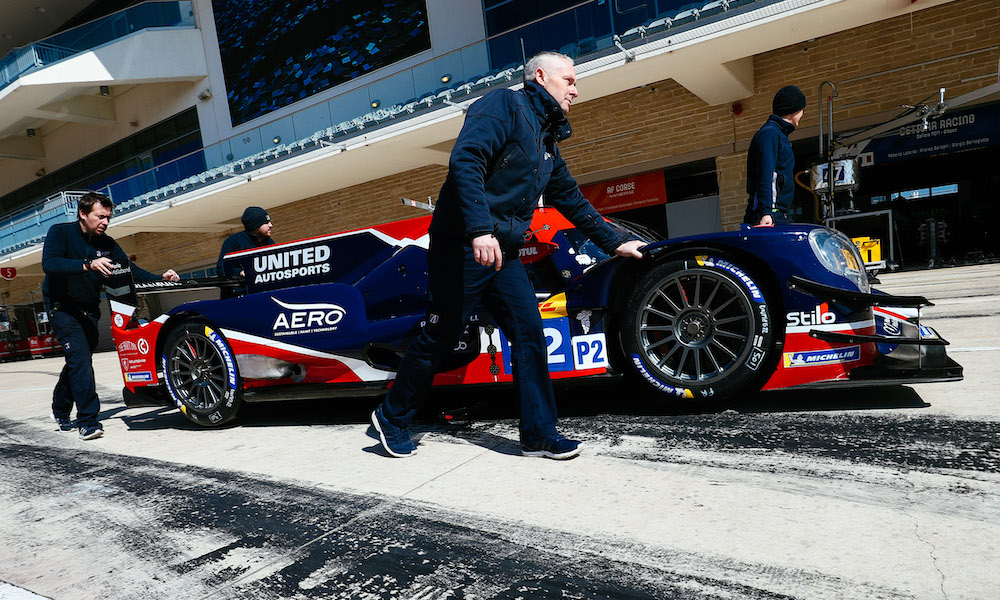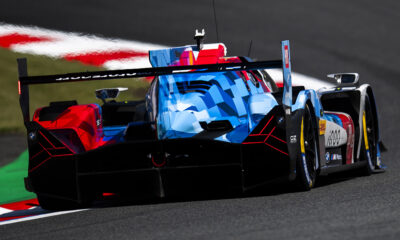
Photo: United Autosports
FIA World Endurance Championship teams are reacting and adapting to the rapidly-changing situation in motorsport that has arisen from the COVID-19 coronavirus pandemic.
The outbreak has resulted in travel restrictions, border closures and public event cancellations around the world, all of which has impacted the sports car racing industry.
The WEC announced last week that it would be canceling the 1000 Miles of Sebring, which was due to take place this weekend, while on Monday it confirmed the postponement of the 6 Hours of Spa.
These unforeseen changes to the WEC schedule mean that, as things stand, the next race on the 2019-20 calendar is the season-ending 24 Hours of Le Mans on June 13-14.
Richard Dean, who is the managing director of LMP2 points leader United Autosports, explained the wider implications that event cancellations are likely to have.
“When it’s got to restart, the world has to restart, but you’ve got to hope that people don’t look upon motor racing as a hobby and non-essential, when you look at how many jobs and livelihoods revolve around it,” he told Sportscar365.
“It’s just the effect it has is potentially catastrophic. In our little business alone, we’ve got 36 full-time people here. We have the same number if not a bit more, of freelancers.
“Everything from some race engineers, to some of the mechanics, to some of the truck drivers… marketing, media, hospitality, catering… some of those have got contracts with us that are maybe 30 days up to 130 days a year.
“So those guys depend on us. Some of them don’t depend solely on us, but for some of them the majority of their income is down to us.”
Dean suggested that the effects of the pandemic on suppliers could pose challenges in the next few months.
In addition to its single Oreca 07 Gibson WEC entry, United also runs Orecas in the European Le Mans Series LMP2 class and operates a multi-series Ligier LMP3 program.
Furthermore, the Yorkshire-based organization has operations in vehicle restoration which Dean said will keep the business ticking over during the current uncertain phase.
The ELMS has postponed its opening two rounds at Barcelona and Monza, meaning that United is facing a dry period of 14 weeks between its last event – the WEC race at Circuit of The Americas – and its next public outing at the Le Mans test day.
“It’s difficult when you’re looking at the financial commitments that are involved in preparing for a race like Le Mans, and the lead times that you need for ordering spares and other things,” said Dean.
“The secondary impact is that even if you wanted to order spares for both ELMS races and Le Mans, Ligier and ORECA are in very difficult positions right now in France.
“From what I’m hearing, they’re going to be closing French factories and businesses soon. And don’t forget that most of the world’s carbon fiber comes out of Italy, and they are already having supply problems.
“So, some of the decisions that we make and take are not necessarily all in our own hands. We’re busy preparing to be even better prepared for the events that are coming up.”
Customers “Understand the Situation”
TDS Racing co-owner Xavier Combet said that his company is currently working out how to manage the unexpected race postponements and cancellations.
The French organization runs operations for three teams: Racing Team Nederland in WEC, G-Drive Racing in ELMS LMP2 and Realteam Racing in ELMS LMP3.
“The relationship with our customers remains good because they understand the situation,” explained Combet.
“Neither party is responsible. If the races are postponed, there is not much to change. On the other hand, if they were to be canceled, we will have to see how to manage these cancellations.
“We are already seeing how to manage Sebring costs: plane, hotel, catering, meeting costs, rental cars. Of course, there is no question of blaming one or the other.
“We are all linked, we must stick together and be clever. I hope that any losses will be minimal.”
Dean added: “We’re going into new territory and it’s difficult to expect anybody to pay for something that they’re not getting, whether that’s a sponsor or a driver.
“However you generate your income to go racing, we’re not delivering that service. But everybody is in the same position.
“We’ve got good relationships with all our sponsors and drivers, so I think everybody is trying to help everybody through it.”
Date Changes Could Impact Multi-Series Teams
TF Sport team principal Tom Ferrier believes that the rescheduling of events to later dates in 2020 could present issues for teams like his which are involved in multiple series.
In addition to its Aston Martin GTE-Am program in WEC, TF also runs four cars in the Intelligent Money British GT Championship.
Both series have vowed to rearrange events scheduled for April that have been postponed due to coronavirus precautions.
“We obviously planned a lot of our British GT testing around Sebring, where we would have been away for 12 days,” Ferrier told Sportscar365.
“The immediate change is that we’re not at Sebring now and we can’t go testing this week because everything’s fully booked. This week is very quiet.
“There’s a lot of waiting around not knowing what we’re doing. One of the jobs is to clean the trophies and move them across the workshop!
“A big fear is that it’s all very well postponing and delaying everything, but when you’re doing multiple championships there are only so many weekends that everything can be rescheduled on, and whether or not the dates are going to work out in terms of clashes.”
The WEC and its logistics partner DHL are currently working to return cars and equipment to the teams following the cancellation of the Sebring race.
According to Ferrier, no delays are currently forecasted in bringing the championship’s freight load back to Europe.
“It’s going to come back on the return freight date as was originally planned, which is April 8,” he said.
“I just think it’s time to be nice to everybody. There’s no point shouting and screaming. Everyone is aware of the situation.”
Laurent Mercier contributed to this report.






















